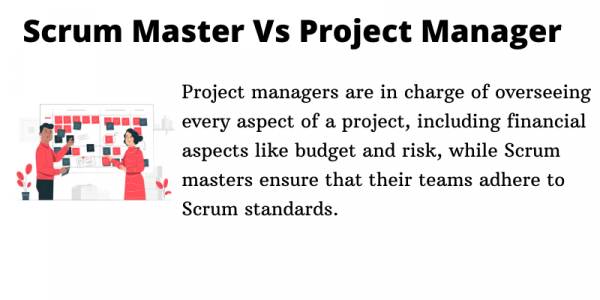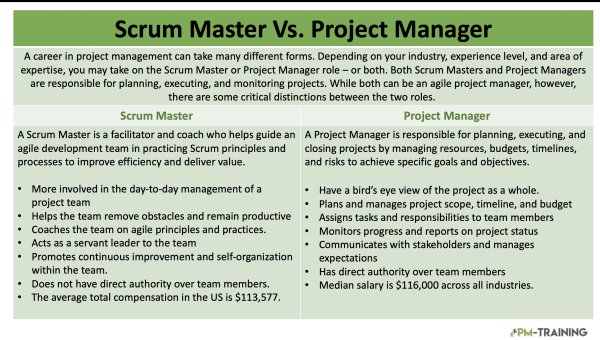A career in project management can take many different forms. Depending on your industry, experience level, and area of expertise, you may take on the Scrum Master or Project Manager role – or both.
You may wonder what the similarities and differences between Scrum Master vs. Project Manager roles are, both positions are essential in a project team but have different functions and responsibilities.
In this article, we will explore the key similarities and differences between these two roles to determine which one is right for you.
Who is a Scrum Master?
In Agile methodology and project management, a Scrum Master is a kind of agile project manager for the Scrum Team. The primary responsibility of a Scrum Master role is to ensure that the development team adheres to the rules of Scrum.
It includes ensuring that the team has a shared understanding of Scrum development. In addition, the Scrum Master is responsible for removing any impediments preventing the team from achieving their Sprint Goal or project progress.
The Scrum Master is not a traditional software development manager; they are more like a coach or facilitator. They do not have any direct authority over the team, but they do have the power to remove impediments. To be successful, a Scrum Master must have a good understanding of human interaction and communicate effectively with the team and stakeholders.
Who is a Project Manager?
A traditional project manager is a professional who oversees a project’s planning, execution, and completion. They are responsible for ensuring that the project is completed on time, within budget, and to the required standards.
Project Managers must have excellent organizational and communication skills and the ability to motivate and monitor teams of employees. In larger organizations, Project Managers may also be responsible for multiple projects.

Key Similarities and Differences of the Role of a Scrum Master and a Project Manager
Both Scrum Masters and Project Managers are responsible for planning, executing, and monitoring projects. While both can be an agile project manager, however, there are some critical distinctions between the two roles.
For one, Scrum Masters are typically more involved in the day-to-day management of a project team, whereas Project Managers usually have a bird’s eye view of the project as a whole.
Additionally, Scrum Masters are often responsible for removing obstacles in the way of team progress. In contrast, the project manager’s role is more focused on ensuring that all project deliverables are met on time and within budget.
Finally, while both roles require excellent communication and interpersonal skills, Scrum Masters must be highly adept at conflict resolution.
Scrum Master vs Project Manager Salary
When comparing the salaries of Project Managers and Scrum Masters, there are a few essential factors to consider.
First, it is crucial to understand that salaries generally vary per industry. For instance, project managers in the IT industry tend to earn more than those in the construction or retail industries.
Second, the nature of the project also plays a role in determining salary levels. For example, project managers overseeing large-scale projects earn more than those working on smaller projects.
With that said, let’s look at some specific salary comparisons between Project Managers and Scrum Masters.
The average total compensation for a Scrum Master in the US is $113,577. In contrast, the median salary for a Project Manager is $116,000 across all industries.
This data suggests that, while there is some variation between wages in different industries, Project Managers generally earn slightly more than Scrum Masters. But typically, since the scrum framework is a bit more specialized, this would translate to slightly higher salaries.
However, it is worth noting that these figures represent average or median salaries, so there will be individual exceptions on both sides.
Finally, it is worth considering that Project Manager and Scrum Master roles are not always mutually exclusive. In many cases, one individual may fulfill both functions on a project. In such cases, the individual’s salary would likely fall between the above-mentioned two averages.
Project Manager Vs Scrum Master Certifications
Scrum Master certifications
To become a Scrum Master, specific certifications are either required or ideal. The most-mentioned Scrum project management certification in job descriptions is the Certified ScrumMaster (CSM) administered by the Scrum Alliance. You can obtain this certification by taking a course and passing an exam.
Another popular certification is the Professional Scrum Master (PSM I) offered by Scrum.org. For this certification, no coursework is required, but you must pass an exam to be certified. Although not required, these certifications will give you the necessary skills and knowledge to be an effective Scrum Master.
Project Management Certifications
Qualified Project Managers are in high demand as organizations across all industries increasingly rely on complex projects to achieve their strategic goals. As a result, several certifications can help you demonstrate your project management skills and knowledge.
Administered by the Project Management Institute (PMI), the Project Management Professional (PMP) certification is widely recognized as a leading credential in the field. To qualify for the PMP exam, you must have at least three years of project management experience.
The Certified Associate in Project Management (CAPM) credential is also administered by the PMI and for entry-level project managers. To qualify for the CAPM exam, you must have a secondary degree (high school diploma or equivalent) and 23 hours of project management training.
Many other project management certifications are available, and many organizations have specific requirements. No matter what certifications you pursue, they can all help you demonstrate your dedication to your career and excellence in project management.
Project Manager Vs Scrum Master Career

When deciding between a career as a Project Manager or Scrum Master, it is vital to understand the similarities and differences between the two positions.
A Project Manager is responsible for developing and executing a project plan, while a Scrum Master is responsible for facilitating the Agile Scrum framework or process. Both roles require excellent communication and organizational skills and the ability to work well under pressure.
However, the Project Manager’s role is more focused on the technical aspects of the project, while the Scrum Master leads team dynamics and facilitates collaboration. As a result, the career paths of these two positions differ in terms of skill sets and opportunities.
A Project Manager typically begins their career in a junior role, such as a Project Coordinator or Assistant Project Manager. With experience, they can move up to Senior Project Manager or Program Manager roles.
In some cases, Project Managers may also transition into management consulting or executive positions, such as Chief Operating Officer (COO) or Chief Information Officer (CIO).
On the other hand, a Scrum leader typically begins their career in an entry-level position, such as Scrum Master Trainee or Product Owner. With experience, they can move up to Agile Coach or Product Manager roles.
Scrum Masters may transition into senior management positions, such as Director of Agile Transformation.
Ultimately, both Project Managers and Scrum Masters can enjoy successful careers with many opportunities for growth and advancement.
How to Become a Scrum Master or Project Manager?
The first step, like any case, is deciding you want to be one. And reaching that decision requires research and understanding what the role truly entails.
Once you’ve decided which of the two career paths you’d like to go for, the next is to go for a particular type of certification. While most jobs may have provided us with project management experience, a certification is a “formal” push into the project management or scrum leader direction. Find a way to get a basic certification under your belt.
The next step is to get more experience. It is the key that will help you separate yourself from others who may have just stopped at the certification level. Scrum Masters and Project Managers must have some “people skills.” They also need to be excellent communicators, both written and verbal. Scrum leader also need to be able to work with minimal supervision, as they’ll often be the ones driving a project forward.
Once you have the experience, it’s time for networking. Scrum Masters and Project Managers need to be able to network for their career advancement and build up a stable of resources they can tap into when they’re working on a project. Networking will also help you keep up with industry trends, which is essential for both Scrum Masters and Project Managers.
Becoming a Scrum Master or Project Manager is not an overnight process. It takes time, dedication, and a willingness to learn and grow in your role. However, the rewards of a successful career in Scrum or Project Management are well worth the effort.
So, which is suitable for you—a career as a Scrum Master or a Project Manager? The answer may depend on your industry, experience level, and areas of expertise. However, both roles offer opportunities for professional growth and development.
If you’re interested in pursuing a career in project management, consider obtaining a certification from a reputable organization such as PMI or Agile Alliance. And if you’re looking to enhance your skill set further, consider pursuing a master’s degree in project management or a related field.
